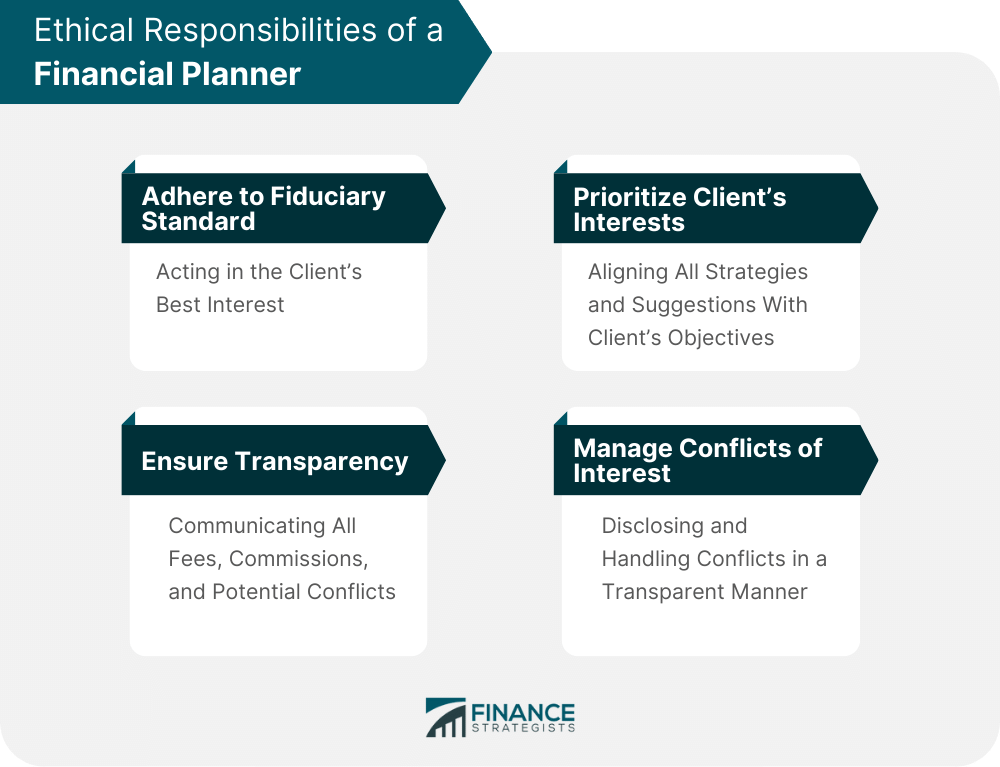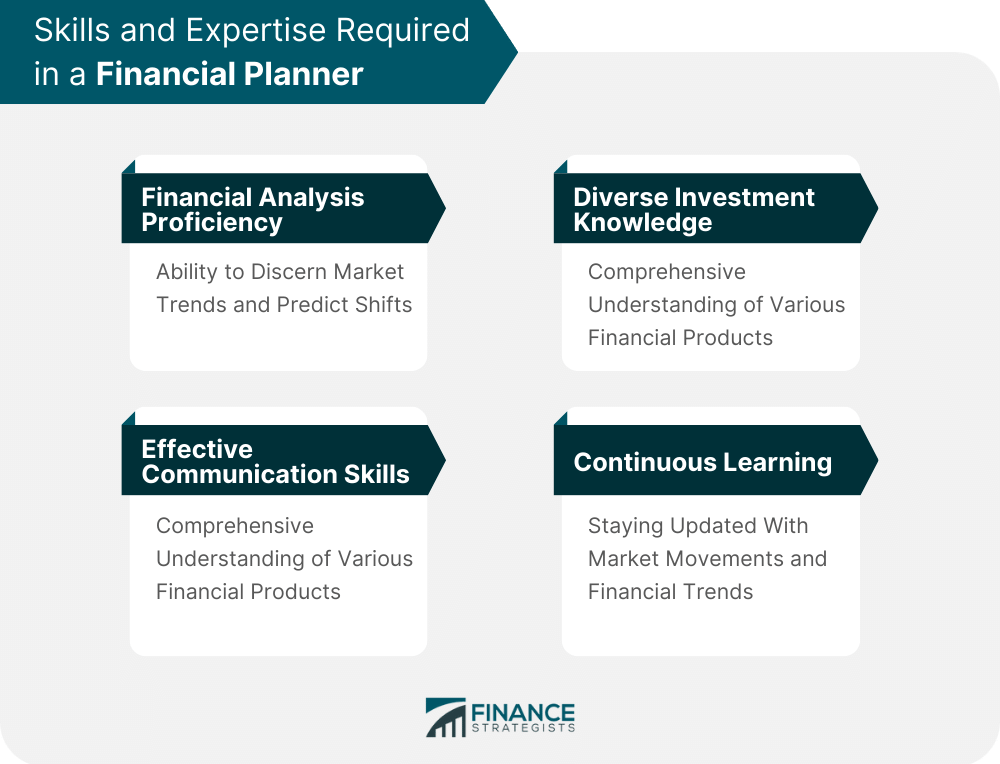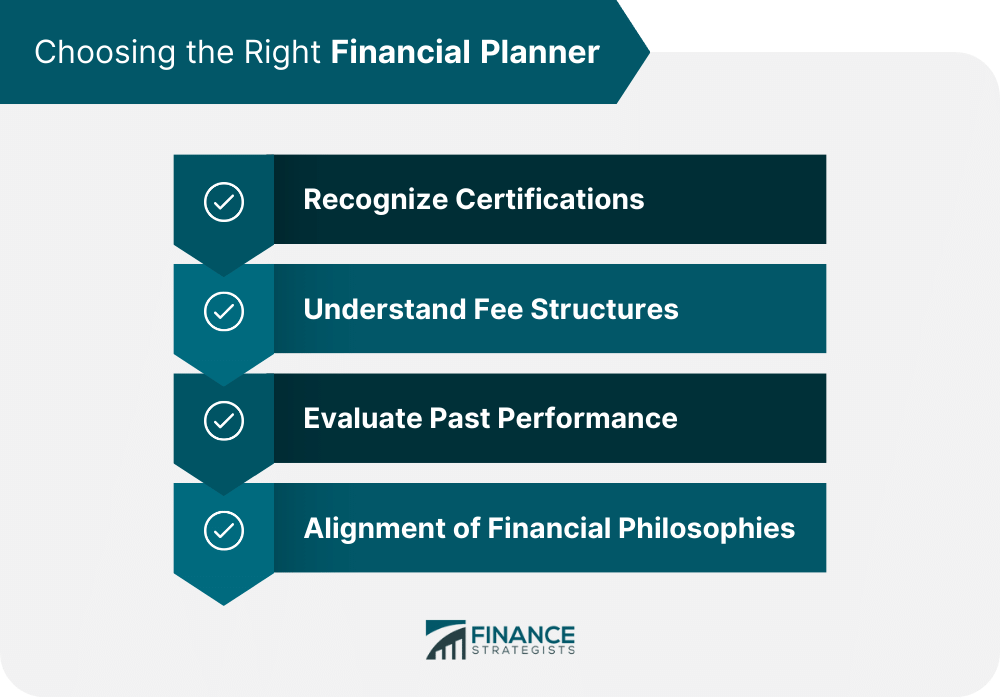A financial planner plays a multifaceted role in assisting individuals and businesses to achieve their financial goals. At the core, a financial planner evaluates a client's financial status and identifies investment strategies. They establish clear financial objectives based on a client's needs, life stage, and risk tolerance. By developing a comprehensive financial plan, they pave the way for wealth accumulation, debt management, and retirement planning. Moreover, they provide expert advice on tax strategies, insurance decisions, and estate planning, ensuring all financial decisions are tax-efficient and catered to a client's legacy aspirations. Regularly reviewing and adjusting these plans as life events or market conditions change is also part of their responsibility. In essence, a financial planner offers a holistic approach to financial health, ensuring that every financial move aligns with the client's broader life objectives. Financial planners wield significant influence over their client's monetary decisions. With such power comes considerable responsibility. A financial planner's commitment is, first and foremost, to their client. This means that they must act in the client's best interest, even if it conflicts with their own financial gain. By adhering to a fiduciary standard, they foster trust and demonstrate unwavering professionalism. Every recommendation made, product suggested, or strategy devised should prioritize the client's best interests. Financial planners should meticulously weigh options, ensuring they align with the client's objectives and values. Openness is a cornerstone of ethical financial planning. Planners should communicate all fees, commissions, and potential conflicts of interest, ensuring clients can make informed decisions. In situations where conflicts arise, they should be disclosed and managed appropriately. This might involve recusing oneself from specific decisions or seeking a third-party opinion. In today's digital era, technology is an indispensable ally for financial planners. Advanced software allows for nuanced financial analyses, forecasting potential returns, risks, and more with remarkable accuracy. These tools enable planners to craft strategies with increased precision. With cloud storage and collaborative platforms, sharing and storing financial data has never been safer or more efficient. Regular check-ins can be done remotely, ensuring continuity even in unforeseen circumstances. Automation has paved the way for robo-advisors, which offer algorithm-driven financial advice. While they don't replace human touch, they can be a valuable adjunct, especially for basic investment strategies. To adeptly navigate the complexities of personal finance, a certain skill set is indispensable. A competent financial planner can look at numbers and discern stories. This analytical acumen helps in understanding market trends, predicting shifts, and crafting apt strategies. From stocks and bonds to real estate and commodities, financial planners must possess broad knowledge. They should be adept at weaving diverse elements into a cohesive financial tapestry. Finance is as much about numbers as it is about trust. Planners must be able to convey complex information simply, ensuring clients are always in the loop. The financial realm is in perpetual flux. Continuous learning and a keen eye on market movements ensure planners remain at the top of their game. Expert Advice Tailored to Individual Needs: Financial planners to offer bespoke solutions, understanding that personal finance is, indeed, deeply personal. Increased Potential for Financial Growth and Security: With informed strategies, one is better positioned to grow wealth and mitigate risks, ensuring long-term financial security. Time-Saving and Reduced Financial Stress: Decoding finance can be daunting. Handing the reins to a professional can save time and alleviate financial anxieties. Improved Clarity and Direction in Financial Journey: Having a clear roadmap, crafted by a financial planner, instills confidence and provides direction, making financial goals more attainable. Finding the right financial confidante is pivotal. Here's how: Recognize Certifications and Qualifications: Credentials, like CFP (Certified Financial Planner), speak volumes about a planner's expertise. Understand Fee Structures: Financial planners may charge fees, commissions, or both. Comprehending this can prevent future misunderstandings. Evaluate Past Performance and Client Testimonials: A planner's track record, coupled with client feedback, can offer insights into their expertise and professionalism. Ensure Alignment of Financial Philosophies and Values: Beyond skills, ensuring your financial planner resonates with your values and philosophies is paramount for a harmonious working relationship. The role of a financial planner emerges as a beacon of clarity and direction. These professionals serve as trusted guides, meticulously evaluating clients' financial landscapes, formulating bespoke strategies, and ensuring each decision resonates with the client's broader life aspirations. At the heart of their practice is an unwavering commitment to clients' best interests, upheld through ethical transparency and a fiduciary mandate. With the digital age ushering in innovative tools, the realm of financial planning has evolved, integrating technology for precision, efficiency, and expanded reach. Furthermore, selecting the right planner goes beyond credentials, emphasizing the synergy of values and financial philosophies. In essence, financial planner doesn't just chart financial trajectories; they craft personalized financial stories, ensuring each chapter aligns with one's goals, risks, and life's ever-evolving tapestry.Core Functions of a Financial Planner
Ethical Responsibilities of a Financial Planner
Adhere to a Fiduciary Standard
Prioritize Client’s Best Interests
Ensure Transparency and Full Disclosure
Manage Conflicts of Interest

Role of Technology in a Financial Planner's Function
Modern Tools for Financial Analysis and Projections
Digital Platforms for Communication and Data Storage
Automated Financial Solutions and Robo-Advisors
Skills and Expertise Required in a Financial Planner
Proficiency in Financial Analysis and Forecasting
Understanding of Diverse Investment Vehicles and Strategies
Effective Communication and Interpersonal Skills
Continuous Learning and Staying Updated With Financial Markets

Benefits of Engaging a Financial Planner
Choosing the Right Financial Planner

Conclusion
The Function of a Financial Planner FAQs
The function of a financial planner involves understanding a client's financial objectives, collecting and analyzing their financial data, creating a tailored financial plan, assisting in its implementation, and continually monitoring and revising the plan as needed.
While both roles aim to assist clients in achieving their financial goals, the function of a financial planner is more holistic, encompassing a wide range of financial planning aspects, from investments to retirement. A financial advisor may have a narrower focus, often centering on investment recommendations.
While some individuals possess the knowledge to manage their own finances, the function of a financial planner offers expert insights, structured plans, and ongoing monitoring that can help optimize financial growth, navigate complex financial products, and minimize risks.
The frequency can vary based on individual needs and market conditions, but typically, the function of a financial planner involves regular check-ins, at least annually, to ensure the plan remains aligned with the client's goals and any external changes.
Technology has amplified the function of a financial planner by introducing tools for more accurate financial projections, digital platforms for smoother communication, and even automated solutions like robo-advisors. This has made financial planning more efficient, dynamic, and accessible.
True Tamplin is a published author, public speaker, CEO of UpDigital, and founder of Finance Strategists.
True is a Certified Educator in Personal Finance (CEPF®), author of The Handy Financial Ratios Guide, a member of the Society for Advancing Business Editing and Writing, contributes to his financial education site, Finance Strategists, and has spoken to various financial communities such as the CFA Institute, as well as university students like his Alma mater, Biola University, where he received a bachelor of science in business and data analytics.
To learn more about True, visit his personal website or view his author profiles on Amazon, Nasdaq and Forbes.













